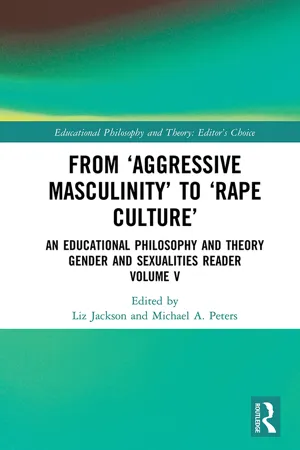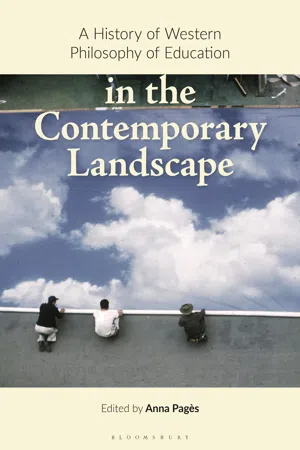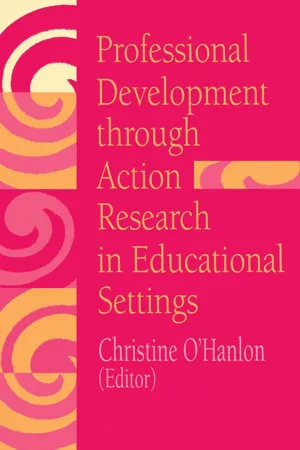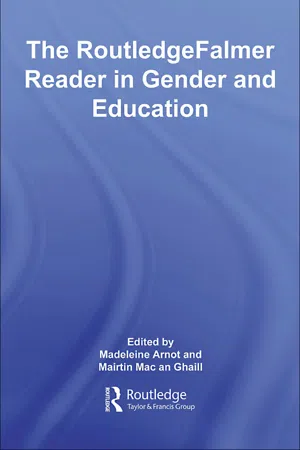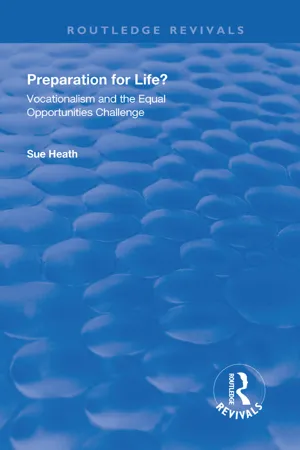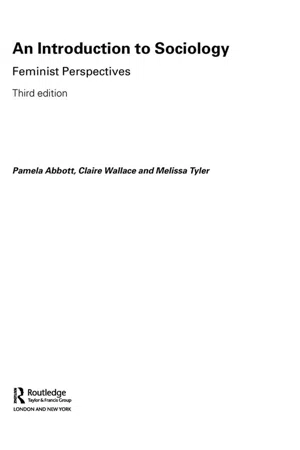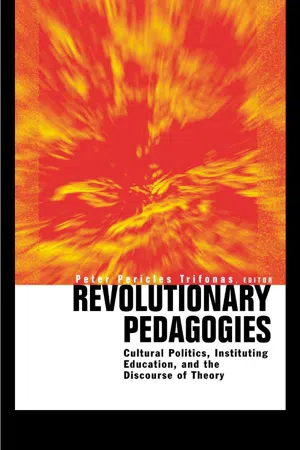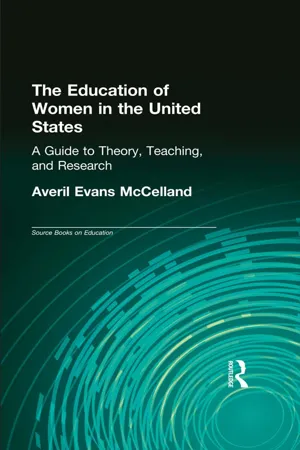Social Sciences
Feminist Theory of Education
The feminist theory of education examines how gender inequalities are perpetuated and challenged within educational systems. It critiques traditional educational practices that reinforce gender stereotypes and advocates for inclusive, equitable, and empowering learning environments. This theory seeks to address issues such as gender bias in curriculum, unequal opportunities for girls and women, and the need for feminist pedagogy.
Written by Perlego with AI-assistance
Related key terms
8 Key excerpts on "Feminist Theory of Education"
- eBook - ePub
From 'Aggressive Masculinity' to 'Rape Culture'
An Educational Philosophy and Theory Gender and Sexualities Reader, Volume V
- Liz Jackson, Michael A. Peters(Authors)
- 2018(Publication Date)
- Routledge(Publisher)
Education for sexism A theoretical analysis of the sex/gender bias in educationBronwyn DaviesEditors' introduction
Bronwyn Davies focuses in this article on understanding how and why gender differences emerge in educative processes. Davies is critical of what she discusses as role socialisation theory, giving a feminist-inspired analysis of the ways in which this perspective obscures the role of children as persons with agency and an active sense of self, which they participate in developing over time. She goes on to critically evaluate social reproduction theory, before considering the ways a feminist theory of discourse can help make sense of how young people identify as gendered and sexual beings in education and society in the context of large societal perspectives and values. As Davies notes, these perspectives and values can be seen to entrench a gender binary and sexist orientation, wherein men and maleness are the norm and women and femaleness are deficient or deviant. Davies articulates as a resolution to this issue the need to engage in critical discourse against gender binary thinking, and she considers different methods for proceeding in such work. The article is a strong example of how feminist philosophy was brought to bear in educational theorising in the late 1980s, foreshadowing works that more emphatically rejected the gender binary in the twenty-first century.Equity
According to Kristeva (1981 and 1986) the feminist struggle, must be seen historically and politically as a three tiered one, consisting of the fight for: equal access to the male symbolic order; equal right to have one’s way of being legitimated by the educational system; and the right to a symbolic order that does not have as its basic underpinning the male female duality. Moi has schematically summarized these as follows:- Women demand access to the symbolic order. Liberal feminism. Equality.
- Women reject the male symbolic order in the name of difference. Radical feminism. Femininity extolled.
- Anna Pagès(Author)
- 2021(Publication Date)
- Bloomsbury Academic(Publisher)
In this sense, adopting feminist perspectives as a way of doing philosophy of education can be seen as a joint effort to redefine the center by looking at the contemporary educational landscape from the margins (Thayer-Bacon and Turner 2007). In addition, feminist engagements with both the style and content of an otherwise male-dominated philosophical discourse have generated new ways of defining which issues and questions count and have significance within the field itself (see, e.g., Stone 1995; Thayer-Bacon, Stone, and Sprecher 2013). Against this background, we suggest, feminist theory and feminist philosophy ought to be of interest to any scholar who is committed to the idea that public education is an education for all and who wants the field of philosophy of education to continue to develop and live on as a scholarly mixed-gender community. Or, in the famous words of bell hooks (2000), “Feminism is for everybody.” The focus of the chapter: The “woman” and the “feminine” In contemporary feminist debate, and as a response to the emerging postmaterialist and postfeminist movements in gender theory, one of the most crucial questions for education is whether feminism itself and its historical focus on the injustices faced by women as women have any relevance today or if it only lends itself to identity politics (Mikkola 2017). Given that much contemporary gender and queer theory problematizes “her” and “she” as central pronouns for feminism and criticizes feminist philosophy for introducing irrelevant, essentialist, or even harmful separations between women and men into theoretical inquiry, a crucial question to ask is what relevance, role, and meaning categories such as “woman/girl” and “feminine/femininity” will have in educational research in the future- eBook - ePub
Professional Development Through Action Research
International Educational Perspectives
- Christine O'Hanlon(Author)
- 2014(Publication Date)
- Routledge(Publisher)
So, I’ve described how feminist approaches to educational research are varied, situated, contradictory, self-critical. I advocate, in my own work, a merger of feminist theories and action research because this seems to push action research deeper into the underlying issues which hinder reformational school reform (such as agencies and epistemologies) and keeps us from a too-comfortable reliance on generalized educational theories. (See Soltis, 1994, for the difference between reform and reformation.) And, the self-contradictory nature of feminist theory itself helps to keep me grounded. Yet, just as feminist interpretations of societies differ within the United States and across the world, they appear to share a commitment to social justice and see education as an important site to reconsider the exclusion of women and other oppressed groups (Weiler, 1993). Because the merger provides both theoretical ground and a grounded project to critique the very ‘knowledge’ of the purposes and results of education, it also gives me and my students stronger senses of agency and direction.To construct a case for the power of the merger outside of my own work, I will draw upon two current historical trends which seem to relate to the feminist theories reported in the literature above: current (conservative) constructions of schooling and postmodern views of knowledge. I will close by speaking to the potential revolution in teaching and teacher education which could occur from the intersection of feminist theory and action research.The Conservative Nature of Schooling
Hugh Sockett and I argued, in the 93rd Yearbook of the National Society for the Study of Education, entitled Teacher Research and Educational Reform - eBook - ePub
- Madeleine Arnot, Mairtin Mac An Ghaill(Authors)
- 2006(Publication Date)
- Routledge(Publisher)
In tracking gender research in education over time, I focus on contemporary gender theory not because it presents a complete picture of feminist educational research or all of its contending positions, but because it characteristically displays, like other fields of humanities research, theoretical conflicts which are apparent in the broader sphere of contemporary social theory. Without an understanding of the relationship between theoretical conflicts in social theory and education as a domain of study, the development of gender analyses in education will remain elusive. It is with the elucidation of this relationship that this chapter is concerned.I begin with an informal historical sketch of gender research in education followed by a brief reflection on the impetus behind the theoretical shifts in the application of feminist theory to educational research over the last two decades.The development of gender in education as a field of study
Some may argue that the field of gender in education has its origins in the theoretical work of Ann Oakley (1972) and education feminists investigating links between gender, school structures and broader social arrangements. Oakley’s key argument, for example, was that the social category ‘gender’ in the study of inequality was preferable to a focus on sex differences, since it perceived gender as a social construction rather than as a fixed biological in entity. To put this another way, if gender, as opposed to sex, was ultimately a social construct, then its links to socialization could be understood primarily as an aspect of gender identity formation.In keeping with this shift, education feminism in the late 1970s and early 1980s moved beyond the distinctive concerns of liberal and radical feminists to an analysis of education’s role in gender socialization patterns and the reproductive functions of education in shaping gender relations (Dillabough and Arnot, 2002). It was in these respects that Oakley’s (1972) work provided feminists with the conceptual tools for expanding the boundaries of gender research.Second-wave feminist concerns influenced the direction in which this kind of gendered analysis of education might go. For example, research documenting the manifestation of sexual discrimination in schools began to emerge (see Wolpe, 1976; Byrne, 1978; Deem, 1978, 1980; Stanworth, 1981) alongside studies highlighting the links between the form of girls’ education and capitalism (Barrett, 1980; MacDonald, 1980). In such studies, gender and class differentiation and patriarchal school structures were major concerns, as were the consequent equity issues for education. In following the work of radical feminists, early gender analyses examined the patriarchal language of school subjects and school structures (Mahony, 1983, 1985) and exposed what Spender (1980) dubbed the ‘patriarchal paradigm of education’. Influenced by a strong Marxist inflection, many education feminists sought to expose the gender and class inequities emerging from sex-segregated schooling, while others identified important links between the aims of educational policy, male domination and a capitalist economy (David, 1980; Walker and Barton, 1983). By the early 1980s, the most significant motifs were a notion of gender as a theoretical construct, education as a site for the cultivation of gender inequalities (Delamont, 1980) and a concentration on the relationship between the state, national policy and the economy in shaping girls’ education. - eBook - ePub
Preparation for Life?
Vocationalism and the Equal Opportunities Challenge
- Sue Heath(Author)
- 2018(Publication Date)
- Routledge(Publisher)
not to take action.Socialist Feminism: Challenging Oppression
In contrast to liberal feminism, the socialist feminist approach is concerned with exploring the structural roots of educational inequality in the context of a capitalist society. Accordingly, socialist feminists are concerned with the role of the school in reproducing existing sexual and class divisions of labour and the mechanisms by which this is achieved. Weiler (1988) has provided a useful commentary on the work of these writers and has written that,Basic to their approach is the view that women’s oppression in the paid workforce and in domestic work is reproduced through what happens in schools… The major focus of this approach is on the connection between sexist practices in the schools and women’s oppression in society as a whole… Work, both paid and unpaid, becomes the central focus of analysis… (and) they focus on the way schools work ideologically to prepare girls to accept their role as low paid or unpaid workers in capitalism (Weiler, 1988, pp.31, 32).The relationship between schooling and the economy therefore provides a central focal point within this perspective and, not surprisingly, the starting point for socialist feminist perspectives on education is a critique of existing social and cultural reproduction theories. Indeed, most of the criticisms of mainstream theory noted in the first section of this chapter have been made by writers who would locate themselves within the socialist feminist tradition. In response to the failure of mainstream theorists to provide adequate accounts of the impact of gender on the processes they describe, socialist feminists have developed versions of reproduction theory in which the relationship between gender as an ideology and women’s role in production is central. Anne-Marie Wolpe’s work (1978, 1981 and 1988), for example, has pointed to the ideological assumptions underpinning official educational policy statements in the post-war era. She argues that the assumption that women function only (or, at best, chiefly) as wives and mothers, along with the failure to acknowledge women’s participation in paid labour, encouraged girls to see their own work (paid and unpaid) as insignificant, thus serving to reproduce women’s oppression and subordination within the economy. Weiler (1988) has criticised Wolpe, however, for inadequately addressing how these assumptions are put into practice in schools, or how students and teachers accept and incorporate them. She argues that, - eBook - ePub
An Introduction to Sociology
Feminist Perspectives
- Pamela Abbott, Melissa Tyler, Claire Wallace(Authors)
- 2006(Publication Date)
- Routledge(Publisher)
Sociologists (and feminists), then, disagree about what valid sociological knowledge is, and about how that knowledge can best be obtained and defended. Thus sociology and feminism are characterised by fierce and open debates about intractable and important questions. Students have traditionally been introduced to sociological theory via a ‘schools of thought’ approach, each perspective being seen as internally coherent and as rejecting the validity of other approaches. However, there has been a move more recently in sociology (largely since the impact of postmodernist thought on the discipline in the past decade or so) to accept that all theories, all understandings, all explanations are provisional and partial, and perhaps that they provide different (compatible rather than competing) versions of ‘truth’. Although, as we noted above, some explanations continue to be seen as more important, more authoritative and therefore more ‘truthful’ than others – namely malestream rather than feminist theories.In sum, sociologists and feminists do need a framework that enables them to make sense of the social world, to make it meaningful and intelligible. There is no one sociological or feminist perspective, but a set of interrelated theories all providing provisional and partial accounts. Some of them provide competing explanations, but others provide (compatible) understandings of different aspects of social reality and social processes and enable us to make some theoretical sense of what is going on in the social world, however we conceptualise it.Feminist theory
There are a wide variety of feminist views regarding the relationship between feminism and malestream social, political and cultural theory. As Chris Beasley puts it:They range from a perspective which considers feminism and mainstream theory to be compatible and quite similar, to an approach which sees feminism as breaking down the very categories that are used in traditional theory. . . . However, the critique offered by feminism – that is, the viewpoint that there is something inadequate and unjust about traditional theory – is more straightforwardly encapsulated than what feminism offers as the alternative. What feminism actually offers, beyond its initial criticism of existing thought, is very diverse. And so the question remains, ‘what is - eBook - ePub
Revolutionary Pedagogies
Cultural Politics, Education, and Discourse of Theory
- Peter Trifonas(Author)
- 2002(Publication Date)
- Routledge(Publisher)
In emphasizing an adapted yet novel feminist version of the embedded “self,” one might begin to view teachers as political agents who reveal and act upon their differences through a shared and meaningful process of critical reflection. This process does not just imply a negotiation of one’s identity with those of others. It also involves the negotiation of larger political meanings in language across a variety of diverse social contexts (Habermas 1974, Weir 1997). A hermeneutic approach reminds us that the meaning ascribed to identity-formation can never be fixed or predetermined (Thompson 1981). It arises out of the relation between those who interpret and ascribe meaning to action, language, and everyday practices in varied social contexts and circumstances. Such a framework provides more complex theoretical tools for challenging two critically important, though opposed, views of the modern teacher, both of which contribute to the socially constructed nature of women’s subordination. These are: (1) the teacher as an instrumental and unmediated form of masculinity and (2) the “teacher as mother.”In adopting a more sociologically driven feminist framework, we may get closer to challenging and thereby transforming the “real” existence of the gender binary as expressed through formal knowledge structures in education.14 This approach might also allow us to see ways forward in theorizing a conceptual understanding of the role of gender in teachers’ identity-formation which combines both critical modernist conceptions of the self as reflective agent and postmodern notions of the “self ” as authentic and discursive (see also Apple 1996; Gewirtz 1997). In my judgment, three conceptual notions which have their roots in contemporary versions of feminist critical theory are likely to be particularly helpful in rethinking the role of gender in the study of identity-formation in teaching. It is to these themes that I now turn.Intersubjective IdentitiesAs many feminist theorists have argued, self-definition is contingent upon diverse and sometimes conflicting contexts of meaning (see Weir 1997). Such contexts condition the processes which underlie identity-formation: “my identity is produced through a complex process through which I am identified, and identify myself, in terms of intersubjective contexts of meaning” (Weir 1997, 185). Clearly, such a position on identity-formation begs a more complex story about the modern political subject than that offered by many of the male-centered traditions of philosophy which have preceded it. Such complexity, as expressed through feminist dialogue, has much to offer in understanding the gendered nature of identity-formation in teaching. For example, in applying the notion of intersubjec-tivity to identity-formation, educational researchers might consider approaching women teachers’ political “identity” not as a rational entity, but as a complex, subjective, and multifaceted phenomenon embedded in the tension between the desire for political agency and the necessity for mutual recognition (see Weir 1997; Ben-habib 1997) in diverse and sometimes conflicting social contexts. - eBook - ePub
The Education of Women in the United States
A Guide to Theory, Teaching, and Research
- Averil Evans McClelland(Author)
- 2014(Publication Date)
- Routledge(Publisher)
PART I FOUNDATIONS FOR A STUDY OF THE HISTORY OF WOMEN'S EDUCATION PART I FOUNDATIONS FOR A STUDY OF THE HISTORY OF WOMEN'S EDUCATION Education is the means by which society prepares, within the child, the essential conditions of its very existence. — Emile Durkheim Introduction In 1969, Gerda Lerner observed that the relatively new field of women's history needed a broader conceptual framework than that provided by contemporary feminist historians of the subject. Rightly concerned with discovering and rediscovering the lost story of women's lives, they had defined women's history almost entirely in terms of women's struggles against oppression (012). At the same time, she suggested that the scope of studies in women's history be somewhat more focused; the category “woman,” she wrote, “is too vast and diffuse to serve as a valid point of departure” (013, p. 10). In a later essay (014, p. 158), she concludes that not only is the category of “woman” too broad, but that no single conceptual framework is sufficient to describe, analyze, and understand women's experience. In the end, she thought, the study of women's history must eventuate in a “reevaluation of the assumptions and methodology of traditional history and traditional thought” (016, p. 180). The study of the history of the education of women is just such a focus within the more general category of women's history. Scholars who have studied women's education have found that it is a complex affair, one not easily categorized, and one which (like other aspects of women's history) does not quite fit into more traditional historical periods (010). Yet, the study of women's education is an important aspect of history, because a society's attitudes, policies, and practices related to the rearing of the next generation and the continued intellectual and social development of its adult members reflect some of that society's most fundamental values
Index pages curate the most relevant extracts from our library of academic textbooks. They’ve been created using an in-house natural language model (NLM), each adding context and meaning to key research topics.
